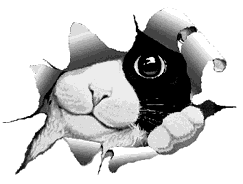
SCOTTISH FOLD
ORIGIN
In 1961 a shepherd by the name of William Ross spotted the first known Scottish Fold cat at a farm near Coupar Angus in the Tayside Region of Scotland, Northwest of Dundee. Ross asked the owners if he could have one of the kittens, and proceeded to develop the breed from the original, Susie, a white barn cat. The unique thing about this cat was that her ears folded forward and downward on her head. The resulting look gave the impression of a “pixie”, “owl”, or “teddy bear” that has captured the hearts of many American cat fanciers and judges. The Scottish Fold was granted championship status by The Cat Fanciers’ Association (CFA) in 1978.
ASPECT
Scottish Folds come in two types: folded ear and straight (normal) ear. Over the last two decades the Scottish Fold has developed a look all its own...even though allowed outcrosses include American Shorthairs and British Shorthairs. The Fold does not necessarily resemble the American Shorthair’s hard, powerful “working cat” body and squared-off muzzle. Nor does it look like the British Shorthair’s massive, compact body, short legs, and flat planed top-head. The Fold, instead, is a medium cat with a rounded, well-padded body and a short, dense, and resilient coat. It has large, round, broadly spaced eyes full of sweetness; well-rounded whisker pads and a short nose with a gentle curve in profile. Scottish Fold kittens are born with straight ears. At about three to four weeks of age, their ears fold...or they don’t! It is usually around eleven to twelve weeks of age that the breeder can determine the quality (pet, breeder or show). Presently, only folded ear cats of Scottish lineage are permitted in the show. Scottish Folds come in any and all colors possible with the exception of those showing evidence of hybridization resulting in the colors chocolate, lavender, the Himalayan pattern, or a combination of these and white.
CHARACTER
Scottish Folds are hardy cats, much like their barnyard ancestors. Their disposition matches their sweet expression. They have tiny voices and are not extremely vocal. They adore human companionship and display this in their own quiet way. Scottish Folds adapt to almost any home situation and are as comfortable in a room full of noisy children and dogs as they are in a single person’s dwelling. They don’t usually panic at shows or in strange hotel rooms, and they adjust to other animals extremely well.
CARE
The Scottish Fold is an undemanding cat. A clean environment, proper nutrition, and generous doses of love are its only requirements.